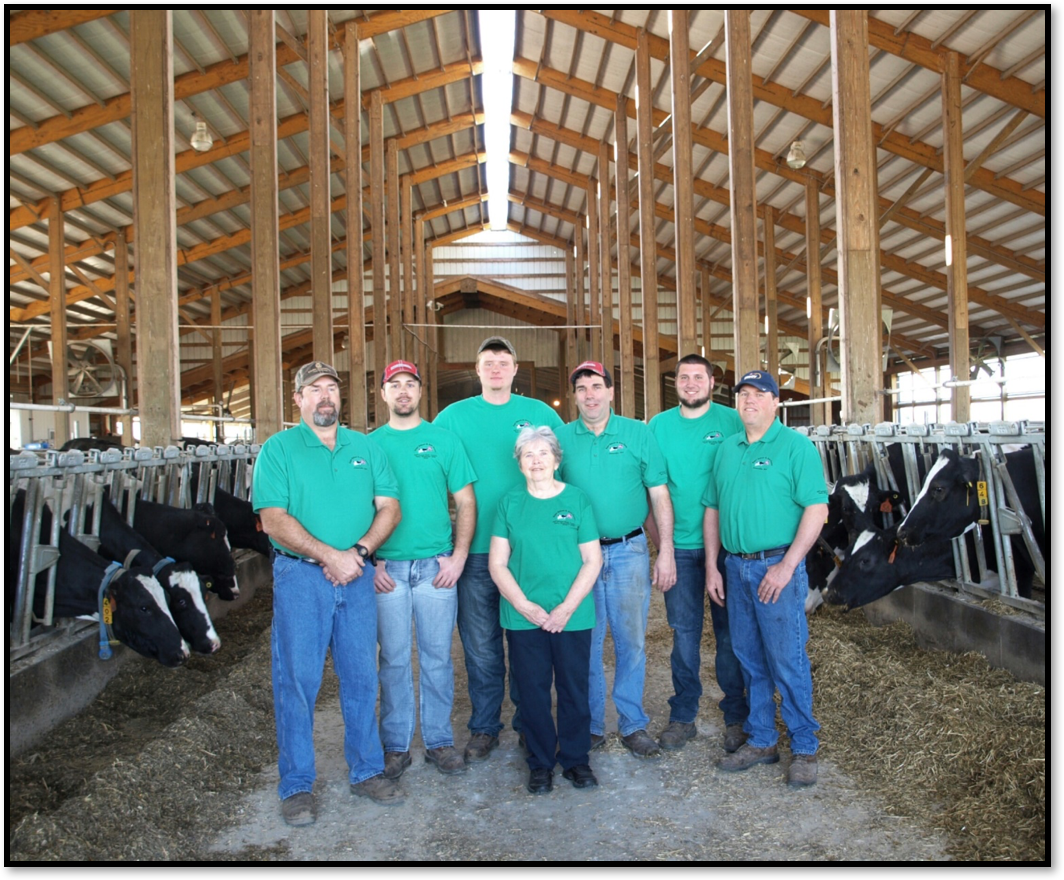
Conversations with David Arndt and the Rebout brothers, whose two farms make up the Discovery Farms core farm cluster in southeast Wisconsin.
UW Discovery Farms is currently monitoring water quality on two farms in Rock County, Wisconsin, an area known for its agricultural diversity. As Nick Baker, Rock County UW-Extension Agriculture Agent, explained in a recent interview, “The county is really diverse. We’re known for a lot of corn-soybeans. We’ve got mint and a lot of canning crops grown here. And pheasant production, dairy production, and livestock production.”
The two farms partnering with UW Discovery Farms are very representative of the diversity that exists in Rock County. “We’re old fashioned farmers. We are doing the same rotating now, only on a bigger scale,” explained David Arndt, who farms with brothers Bob and Allen, and Bob’s sons, Austin and Abraham. They grow just about everything: field corn, seed corn, peas double cropped with green beans, alfalfa, and peppermint. As if that weren’t enough, they also feed out 1,600 head of beef cattle and have 100 beef cows on pasture.
The Rebouts, on the other hand, run 4,000 acres of corn and soybeans. In addition, they have 170 milking cows and ship out 200 Holstein steers each year. They are focused on precision agriculture and strip till all fields in the spring when they put down their nitrogen. They use GPS with an RTK system, which allows them to plant right on the zone of the strip till machine.

The Rebouts, like the Arndts, are a family of brothers and sons that farm together in an area farmed by their families for decades. Currently, brothers David, Doug, and Dan along with David’s oldest son, Eric, Dan’s youngest son, Patrick, and family friend, Sam McGrath, are involved in the operation.
They may represent Rock County’s diverse agriculture, but the Arndts and Rebouts also highlight what we hear a lot from the farmers we work with. They have a strong desire to know if what they’re doing is sound, if there are ways they can improve, and an interest in contributing to the bigger picture in a mutually beneficial way.
Or as David Arndt puts it, “We just want to verify we are doing okay. Just like our soil probe that checks over what we are doing with our irrigators. We think we are probably doing alright before that but you want to verify it, you want to have some proof. And sometime, somewhere down the line somebody is going to ask for that proof. Someone is going to want the real story in the end. You wouldn’t get funding to do your work if no one thought it was valuable.”
When asked why they chose to participate, the Rebouts gave a similar answer: “Part of it is just curiosity to see if what we are doing is doing what we think it is doing. Curiosity is part of what got us into it,” explained Dan Rebout. “We hope to learn what we are doing, how we are doing it, and can we get any better? Are there tweaks we can make here and there to improve it? The benefit is knowing that we are on the right track and headed in the right direction as to conserving the land. We try to be good stewards of the land.”
Participating in Discovery Farms requires being open to learning where there might be room for improvement and a willingness to share information. Data privacy is a real concern, but as Nick Baker highlighted, it is about the greater good. “It shows too that you have local producers that aren’t concerned and are willing to use their own records, their own data, their own cropping systems for the greater good beyond themselves but also using that data to benefit other farms in the area.”
“It is good to cooperate with you guys. Cooperation with the institutions of higher level learning is important. It’s important for you to know what is happening in the countryside. You gain a lot from us and we gain a lot from you. It should be mutually beneficial,” explained David Arndt.
At the end of the day, it is all about learning together. Discovery Farms can provide the data and the Arndts, Rebouts and all Discovery Farms participants offer decades of experience and a desire for continual improvement.
This article originally appeared in the latest UW Discovery Farms newsletter. If you would like to read more from the newsletter please click here.

- 2017 by the numbers - January 23, 2018
- Tile Drainage in Wisconsin publication updated - September 11, 2017
- Discovery Farms – Proactive progress for today and beyond - June 1, 2017